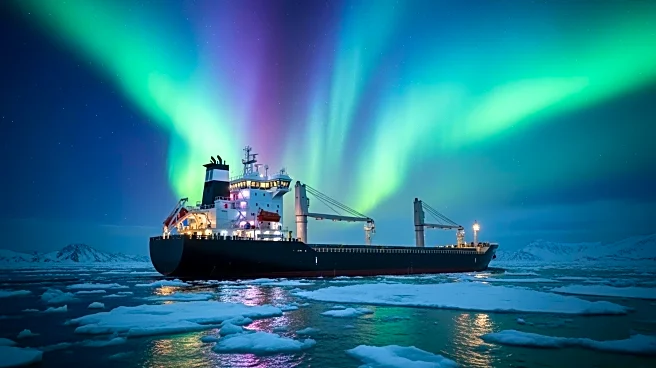What's Happening?
A Chinese container ship, the Istanbul Bridge, has completed its maiden voyage through the Arctic to the UK, significantly reducing delivery times for goods such as electric vehicles and solar panels destined
for Europe. The journey, which took 20 days, was delayed by a storm but still halved the usual transit time compared to traditional routes through the Suez Canal or around the Cape of Good Hope. The Northern Sea Route, now navigable due to global warming, offers a faster maritime link between China and the European Union. This development comes amid China's efforts to diversify its export markets in response to a trade war with the United States.
Why It's Important?
The successful Arctic voyage by the Chinese freighter underscores the impact of climate change on global shipping routes, offering new opportunities for faster trade between Asia and Europe. As the Arctic continues to warm, seasonal windows for commercial shipping are expanding, potentially reshaping global trade dynamics. For China, this route provides a strategic advantage in reducing dependence on traditional shipping lanes like the Strait of Malacca, enhancing its ability to sustain economic growth amid geopolitical tensions. The reduced delivery times could benefit European consumers and businesses by lowering costs and improving supply chain efficiency.
What's Next?
The opening of the Arctic route may lead to increased maritime cooperation between China and Russia, as both countries seek to capitalize on the new shipping opportunities. Other nations and shipping companies may also explore the viability of Arctic routes, potentially leading to increased investment in infrastructure and technology to support Arctic navigation. However, unpredictable weather and sailing conditions pose challenges that must be addressed to ensure safe and reliable passage. The environmental impact of increased shipping activity in the Arctic will likely be scrutinized, prompting discussions on sustainable practices and regulations.
Beyond the Headlines
The use of Arctic routes raises ethical and environmental concerns, particularly regarding the preservation of fragile ecosystems and the rights of indigenous communities. As commercial activity in the Arctic increases, balancing economic interests with environmental stewardship will be crucial. Additionally, the geopolitical implications of Arctic shipping routes may influence international relations, as countries vie for control and access to these strategic passages. Long-term, the shift towards Arctic navigation could drive changes in global trade patterns, affecting industries and economies worldwide.









